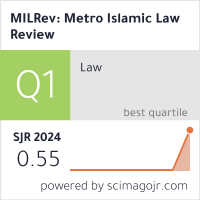Outsourcing and Labour Justice in Indonesia: Integrating Contemporary Islamic Legal Principles with the National Regulatory Framework
DOI:
https://doi.org/10.32332/milrev.v4i2.11157Keywords:
Contemporary Islamic Law, Employment Justice, Maqāṣid Al-Sharī’ah, Outsourcing.Abstract
This study examines the practice of outsourcing labour in Indonesia by integrating contemporary Islamic legal principles with national labour regulatory frameworks. Using a qualitative approach with field study methods, data were collected through in-depth interviews with outsourced workers, entrepreneurs, labour activists, and Islamic law experts in several industrial areas. The findings indicate that although national laws and regulations, particularly Law Number 13 of 2003 on Manpower and its amendments, formally regulate outsourcing mechanisms, their practical implementation often fails to ensure substantive justice for workers. Many outsourced employees continue to face significant challenges, including job insecurity, unpaid wages, and limited access to social security, which collectively undermine their welfare and dignity. From the perspective of Islamic law, especially when viewed through the framework of maqāṣid al-sharī’ah, the protection of workers’ rights and dignity is an integral objective of the shari‘a, which emphasises justice, public benefit, and the safeguarding of vulnerable groups. This perspective highlights that the ethical and humane treatment of workers is not only a legal responsibility but also a moral imperative grounded in religious principles. By examining the intersection between Islamic legal norms and positive labour law, this study proposes a more ethical and contextual model of employment justice that responds to both regulatory shortcomings and socio-economic realities. The findings contribute to the development of more equitable and sustainable labour policies in Indonesia. Academically, this research enriches the discourse on Islamic law and labour studies by bridging normative theory with empirical realities and offering a framework for future comparative studies on outsourcing practices in Muslim-majority countries.
Downloads
References
Adriansyah, Muhammad Ali, Seger Handoyo, Hendro Margono, Sheikh Adnan Ahmed Usmani, dan Dian Dwi Nur Rahmah. “Enhancing Employability in the Digital Era: A Case Study of Online Workers Through the Lens of Contemporary Islamic Economic Law.” MILRev: Metro Islamic Law Review 4, no. 1 (2025): 1. https://doi.org/10.32332/milrev.v4i1.10223.
Amir, Akmal Adzharuz Dzaki, Sandi Prayoga, dan Aadil Ahmad Shairgojri. “The Contemporary Politics of Welfare and Anxiety: A Fiqh Siyasah Review of Indonesia’s 2045 Vision.” NUSANTARA: Journal Of Law Studies 4, no. 01 (2025): 29–43. https://doi.org/10.5281/zenodo.17353871.
Andriana, Novita, dan Ari Prasetyo. “Implementasi Komponen Maqashid Syariah Terhadap Kesejahteraan Pada Karyawan Yayasan Nurul Hayat Surabaya.” Jurnal Ekonomi Syariah Teori Dan Terapan 6, no. 3 (2019): 3. https://doi.org/10.20473/vol6iss20193pp428-445.
Azmi, Naelul, Imron Hamzah, Md Yazid Ahmad, dan Sérgio António Neves Lousada. “Maqasid Al-Shariah: Foundation for Sustainable Sharia Economic Development.” Al-Tijarah 1, no. 1 (2024): 1.
Darmawan, Anri. “pengaturan hukum terhadap pekerja outsourcing ditinjau dari undang-undang ketenagakerjaan dan undang-undang cipta kerja.” Varia Hukum 3, no. 2 (2021): 2. https://doi.org/10.15575/vh.v3i2.12607.
Enggardini, Rohma Vihana, dan Moh Qudsi Fauzy. “Kesejahteraan Karyawan Perspektif Maqashid Syariah Pada Pusat Penelitian Kopi Dan Kakao.” Jurnal Ekonomi Syariah Teori Dan Terapan 4, no. 8 (2017): 8. https://doi.org/10.20473/vol4iss20178pp599-612.
Fath, Al, Nada Syifa Nurulhuda, dan Virna Amalia Nur Permata. “Tinjauan Yuridis atas Kebijakan Outsourcing di Indonesia dan Implikasinya terhadap Kesejahteraan Pekerja.” Jurnal Hukum Statuta 3, no. 2 (2024): 63–73. https://doi.org/10.35586/jhs.v3i2.9027.
Habibi, Nugroho, M. Dio Rhiza Amrizal, Irkham Syahrul Rozikin, dan Iqbal Faza Ahmad. “Memperkuat Perlindungan Pekerja Outsourcing: Analisis Implementasi Kebijakan.” Journal of Social Movements 1, no. 1 (2024): 1. https://doi.org/10.62491/jsm.v1i1.2024.5.
Hafizh, Dean Fadhurohman, Genta Maghribi, Rita Mulyani, Sastia Roria Afradyta, dan Sharen Fernanda. “Analisis Praktik Outsourcing Dalam Perspektif Undang-Undang Cipta Kerja.” Jurnal Lemhannas RI 10, no. 3 (2022): 3. https://doi.org/10.55960/jlri.v10i3.298.
Hidayat, Ma’ruf. “Analisis Kebijakan Ekonomi Dan Kesejahteraan Sosial Perspektif Maqashid Asy-Syariah (Studi Pasal 88 UU Nomor 11 Tahun 2020).” Jurnal Penelitian Agama 22, no. 1 (2021): 49–64. https://doi.org/10.24090/jpa.v22i1.2021.pp49-64.
Hutagalung, Glenn Heski Obilga, dan Sonhaji. “Tinjauan Yuridis Terhadap Sistem Outsourcing Berdasarkan Undang-Undang Nomor 13 Tahun 2003 Tentang Ketenagakerjaan.” Diponegoro Law Journal 6, no. 1 (2017). https://doi.org/10.14710/dlj.2017.15547.
Khairani, Khairani. “Analisis Permasalahan Outsourcing dari Perspektif Hukum dan Penerapannya.” Kanun Jurnal Ilmu Hukum 14, no. 1 (2012): 1.
Kholil, Suparman. “Etika Produksi Islami Berbasis Maqashid Al-Shariah: Pilar Kesejahteraan Sosial Dan Ekonomi.” Equality: Journal of Islamic Law (EJIL) 3, no. 1 (2025): 1. https://doi.org/10.15575/ejil.v3i1.1220.
Marwah, Andi, Nasrullah bin Sapa, dan Abdul Syatar. “Integrating Maqashid al-Shariah into Islamic Economic Practices: A Contemporary Analytical Framework and Its Applications.” El-kahfi | Journal of Islamic Economics 6, no. 01 (2025): 01. https://doi.org/10.58958/elkahfi.v6i01.456.
Maryam, Bismi Nursyamsia, dan M. Thahir Maloko. “Keselamatan Kerja Dalam Perspektif Maqashid Al Syariah.” Siyasatuna : Jurnal Ilmiah Mahasiswa Siyasah Syar’iyyah 3, no. 2 (2022): 2.
Mulyono, Edi, dan Mahmoud Mohamed Ali Mahmoud Edris. “From Jurisprudence to Algorithms: The Role of Artificial Intelligence in Contemporary Sharia Financial Decision-Making.” NUSANTARA: Journal Of Law Studies 4, no. 2 (2025): 129–142. https://doi.org/10.5281/zenodo.17341980.
Nafila, Nafila, Erlin Kristine, dan Endra Wijaya. “Perlindungan Hak-Hak Buruh Pada Praktik Sistem Outsourcing: Sebuah Kesenjangan Penerimaan.” Jurnal Hukum Novelty 8, no. 2 (2017): 2. https://doi.org/10.26555/novelty.v8i2.a5552.
Nasfi, Nasfi, dan Sabri Sabri. “Maqashid Syariah Sebagai Basis Pengembangan Ekonomi Islam.” El-kahfi | Journal of Islamic Economics 3, no. 01 (2022): 01. https://doi.org/10.58958/elkahfi.v3i01.81.
Nasution, Muhammad Arsad, dan Rosnani Siregar. “Outsourcing Tenaga Kerja: Analisis Terhadap Maslahat Dan Mafsadat Yang Ditimbulkan Menurut Hukum Islam.” Tasyri’ : Journal of Islamic Law 4, no. 1 (2025): 1. https://doi.org/10.53038/tsyr.v4i1.256.
Nurhidayatullah, Achmad Syawal, dan Oman Fathurohman Sw. “Maqashid Syariah Sebagai Kerangka Kerja Untuk Inovasi Produk Keuangan Non Bank Dalam Era Digital.” Jurnal Masharif Al-Syariah: Jurnal Ekonomi Dan Perbankan Syariah 9, no. 5 (2024): 5. https://doi.org/10.30651/jms.v9i5.24835.
Nursalim, Chairunnisa Ramadhani Putri, dan Leli Joko Suryono. “Perlindungan Hukum Tenaga Kerja Pada Perjanjian Kerja Outsourcing.” Media of Law and Sharia 2, no. 1 (2020): 1. https://doi.org/10.18196/mls.v2i1.11478.
Prabhaputra, Anak Agung, I. Nyoman Putu Budiartha (Scopus Id: 57202765630), dan I. Putu Gde Seputra. “Sistem Outsourcing Dalam Hubungan Industrial Di Indonesia (Outsourcing System In Industrial Relation In Indonesia).” Jurnal Analogi Hukum 1, no. 1 (2019): 22–27. https://doi.org/10.22225/ah.1.1.2019.22-27.
Pratiwi, Wiwin Budi, dan Devi Andani. “Perlindungan Hukum Tenaga Kerja Dengan Sistem Outsourcing Di Indonesia.” Jurnal Hukum IUS QUIA IUSTUM 29, no. 3 (2022): 3. https://doi.org/10.20885/iustum.vol29.iss3.art9.
Rishan, Idul. “Evaluasi Performa Legislasi Dalam Pembentukan Omnibus Law Cipta Kerja: Kajian Legisprudensi.” Undang: Jurnal Hukum 5, no. 1 (2022): 1. https://doi.org/10.22437/ujh.5.1.43-67.
Romadhani, Karunia, Duta Annisa, dan Tika Widiastuti. “Pengaruh Maqashid Syariah Dan Efektivitas Program Mec Terhadap Kesejahteraan Mustahik Melalui Produktivitas Kerja.” Jurnal Ekonomika dan Bisnis Islam 7, no. 2 (2024): 1–17. https://doi.org/10.26740/jekobi.v7n2.p1-17.
Saefuloh, Asep Ahmad. “Kebijakan Outsourcing di Indonesia: Perkembangan dan Permasalahan.” Jurnal Ekonomi dan Kebijakan Publik 2, no. 1 (2011): 1. https://doi.org/10.22212/jekp.v2i1.162.
Santoso, Hari Agus. “Efektifitas Undang-Undang Cipta Kerja Terhadap Peningkatan Investasi.” Jurnal Hukum Positum 6, no. 2 (2021): 2.
Seraji, Mostafa, dan Kamal Halili Hassan. “Freedom of Association in Labour Relations in the Context of the Maqasid-al-Shari’ah Principles.” European Journal of Law and Economics 45, no. 2 (2018): 377–395. https://doi.org/10.1007/s10657-013-9393-0.
Solechan, Solechan. “Pengawasan Pelaksanaan Sistem Outsourcing yang Berbasis Pada Hak Asasi Manusia.” Administrative Law and Governance Journal 2, no. 2 (2019): 337–348. https://doi.org/10.14710/alj.v2i2.337-348.
Suyoko, Suyoko, dan Mohammad Ghufron Az. “Tinjauan Yuridis Terhadap Sistem Alih Daya (Outsourcing) Pada Pekerja Di Indonesia.” Jurnal Cakrawala Hukum 12, no. 1 (2021): 99–109. https://doi.org/10.26905/idjch.v12i1.5780.
Downloads
Published
Issue
Section
License
Copyright (c) 2025 Arpangi, Gunarto, Nanang Sri Darmadi, Trubus Wahyudi

This work is licensed under a Creative Commons Attribution-ShareAlike 4.0 International License.










